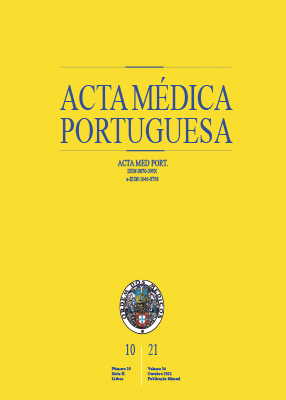Parechovirus Genotype 3 Outbreak Among Young Infants in Portugal
DOI:
https://doi.org/10.20344/amp.15032Keywords:
Communicable Diseases, Emerging, Infant, Parechovirus, Picornaviridae Infections, PortugalAbstract
Introduction: Human parechovirus type 3 has been recognized as a cause of pediatric infection, occasionally associated with serious illness, including sepsis and meningitis, particularly among young infants. The aim of this study is to report the first known human parechovirus type 3 outbreak in Portugal.
Material and Methods: Descriptive study of an outbreak that occurred between the 8th June to the 12th August 2016. Laboratory diagnosis was made by reverse transcription - polymerase chain reaction in the cerebrospinal fluid and/or in stools. Genotyping was made by reverse transcription - polymerase chain reaction and sequencing in stool samples from infants and family members.
Results: Human parechovirus type 3 infection was detected in seven infants, of which six were male. Median age was 23 days (5 - 52). One had seizures, with a magnetic resonance imaging scan showing white matter diffusion restriction. The mean duration of admission was 5.6 days (3 - 11), with favourable outcome in all. In three cases there were symptomatic close family members. Human parechovirus type 3 was identified in the stools of three mothers.
Discussion: Even though human parechovirus type 3 infection has been well described in the presented age group, most Portuguese hospitals do not have this laboratory diagnosis. Our results are comparable to those obtained in other countries. Besides detection of the virus in the cerebrospinal fluid, there were no raised local or systemic inflammatory markers.
Conclusion: This study reports the first known outbreak, in infants, of human parechovirus type 3 in Portugal. Although there is no specific treatment, this diagnosis can avoid unnecessary empirical antibiotic treatment and prolonged admissions.
Downloads
Downloads
Published
How to Cite
Issue
Section
License
All the articles published in the AMP are open access and comply with the requirements of funding agencies or academic institutions. The AMP is governed by the terms of the Creative Commons ‘Attribution – Non-Commercial Use - (CC-BY-NC)’ license, regarding the use by third parties.
It is the author’s responsibility to obtain approval for the reproduction of figures, tables, etc. from other publications.
Upon acceptance of an article for publication, the authors will be asked to complete the ICMJE “Copyright Liability and Copyright Sharing Statement “(http://www.actamedicaportuguesa.com/info/AMP-NormasPublicacao.pdf) and the “Declaration of Potential Conflicts of Interest” (http:// www.icmje.org/conflicts-of-interest). An e-mail will be sent to the corresponding author to acknowledge receipt of the manuscript.
After publication, the authors are authorised to make their articles available in repositories of their institutions of origin, as long as they always mention where they were published and according to the Creative Commons license.









